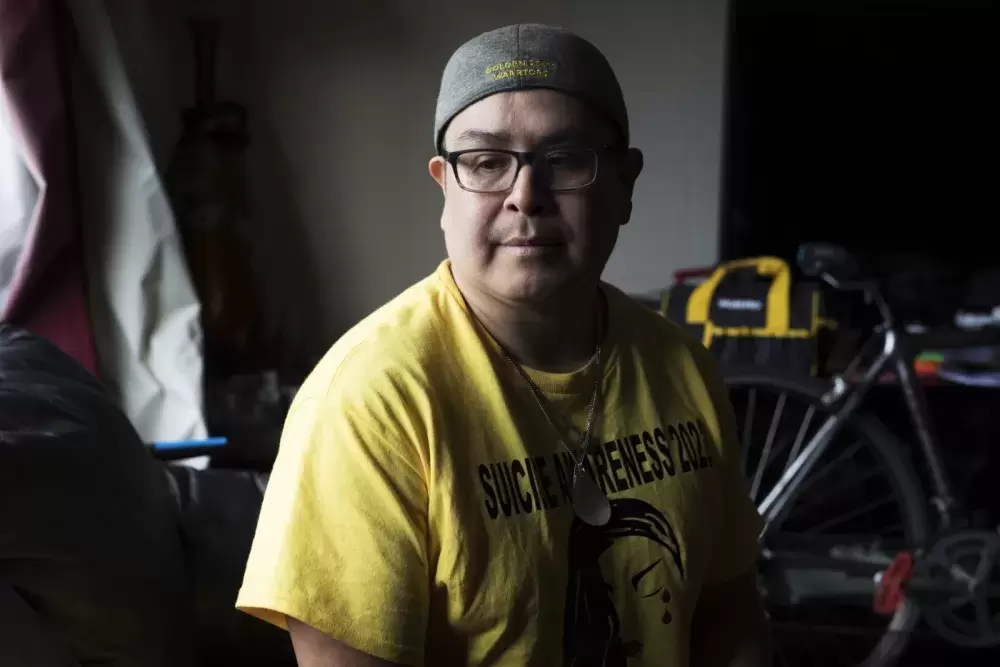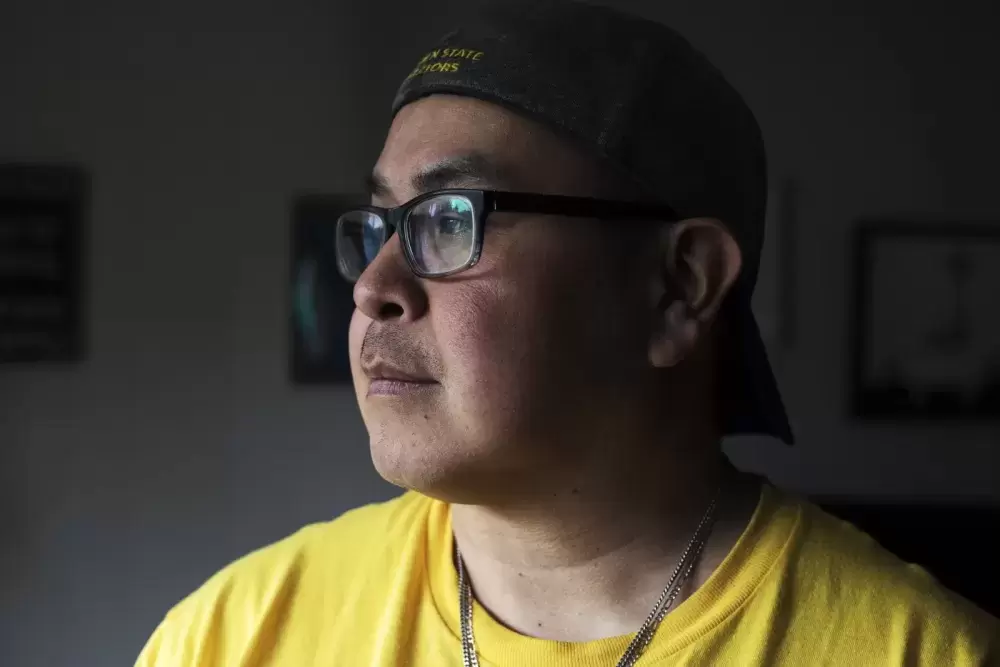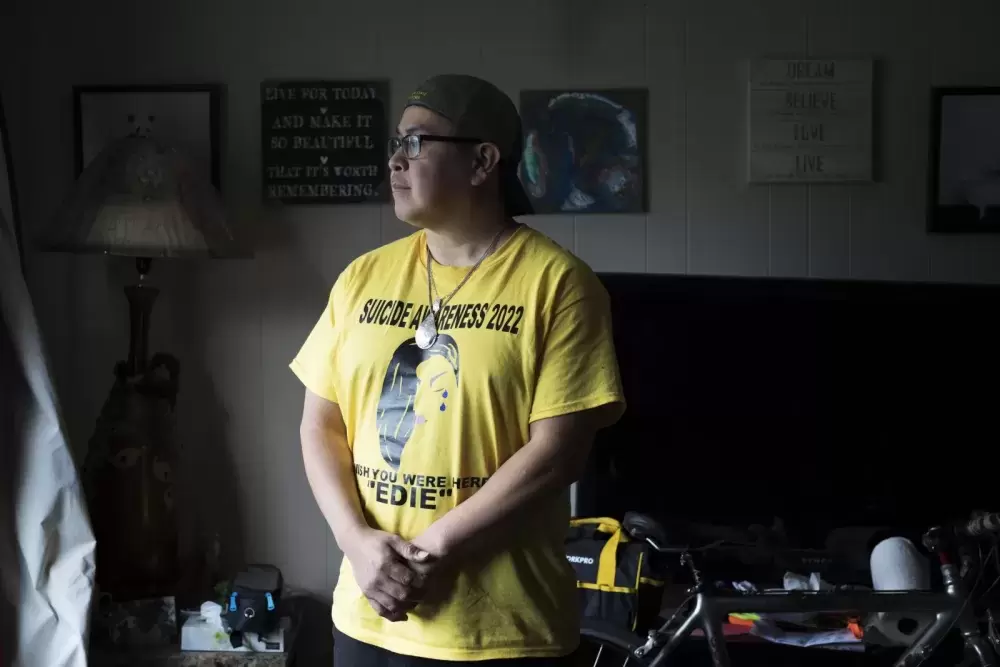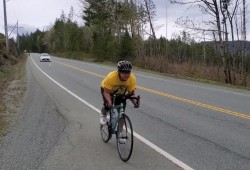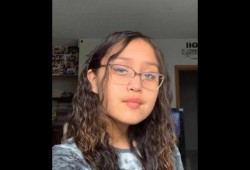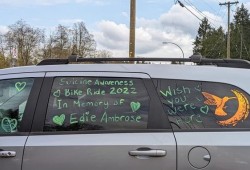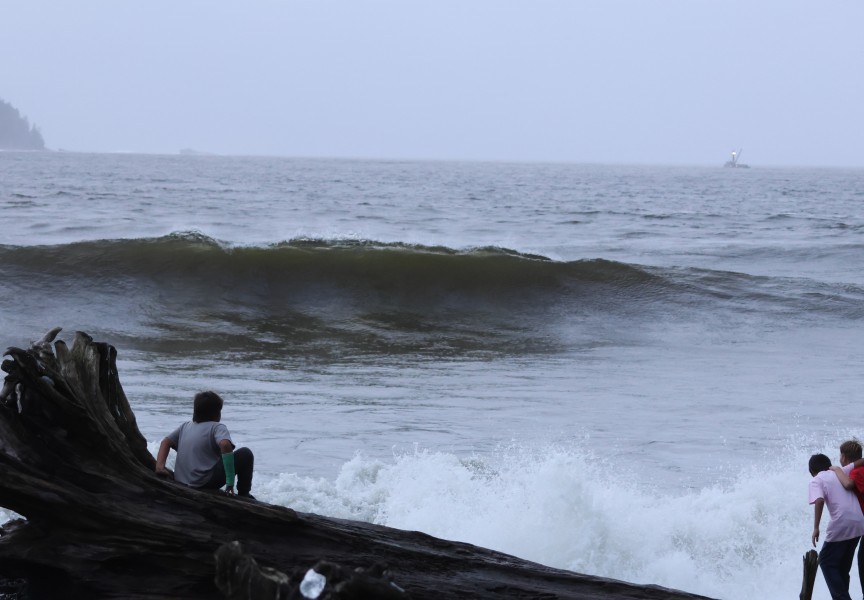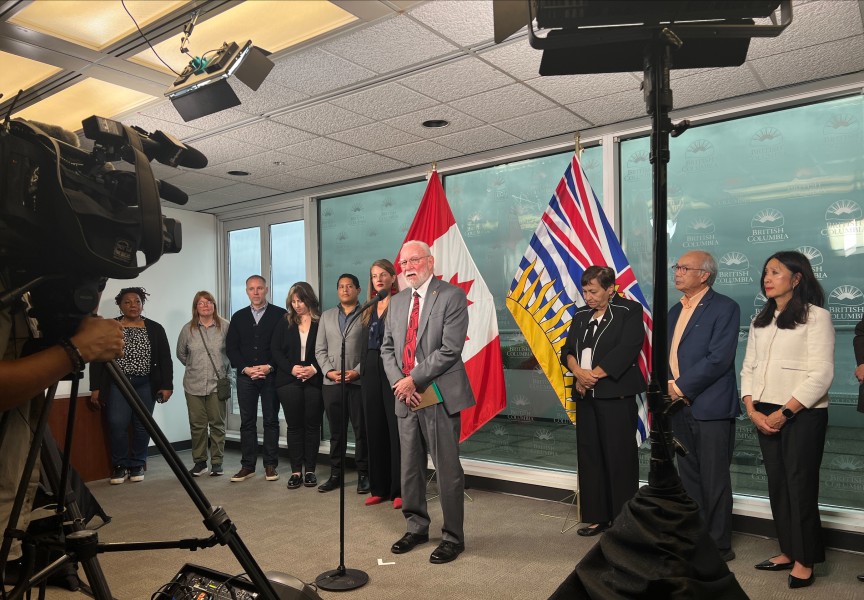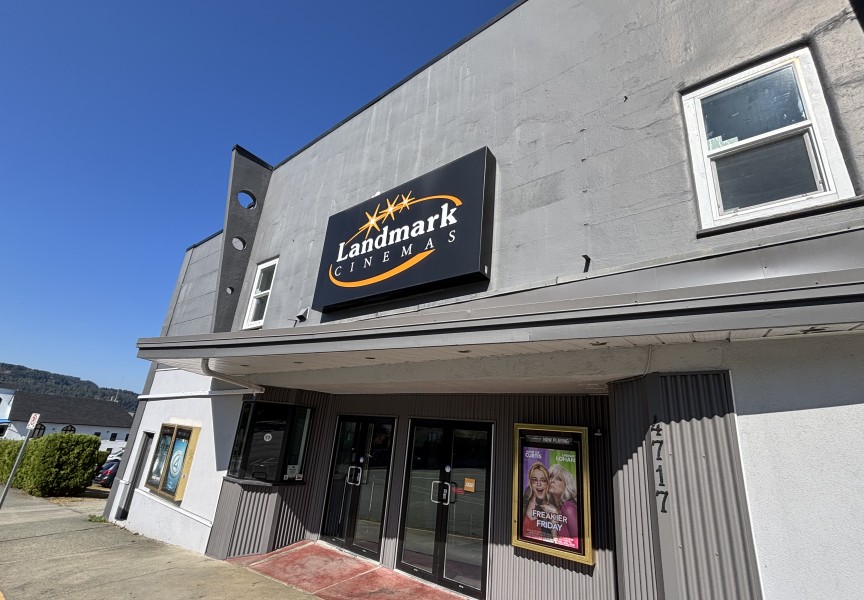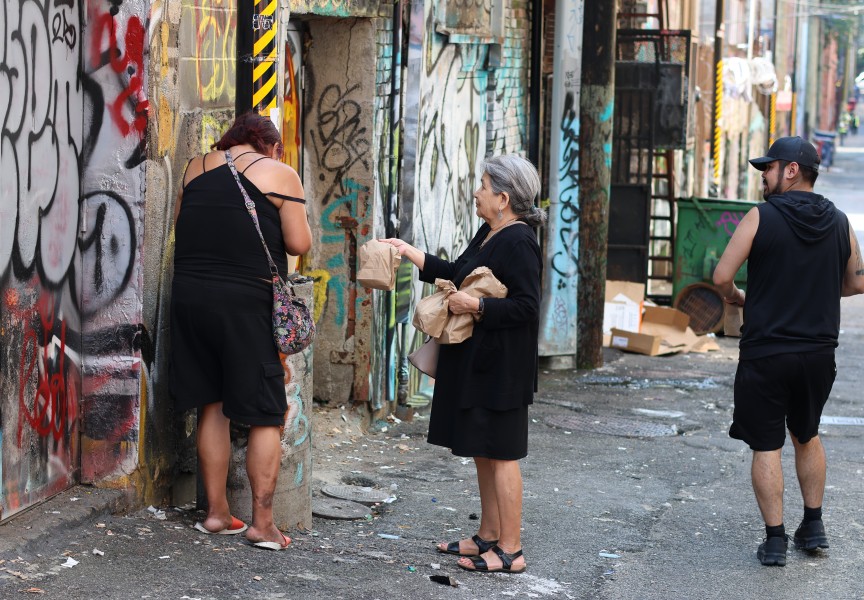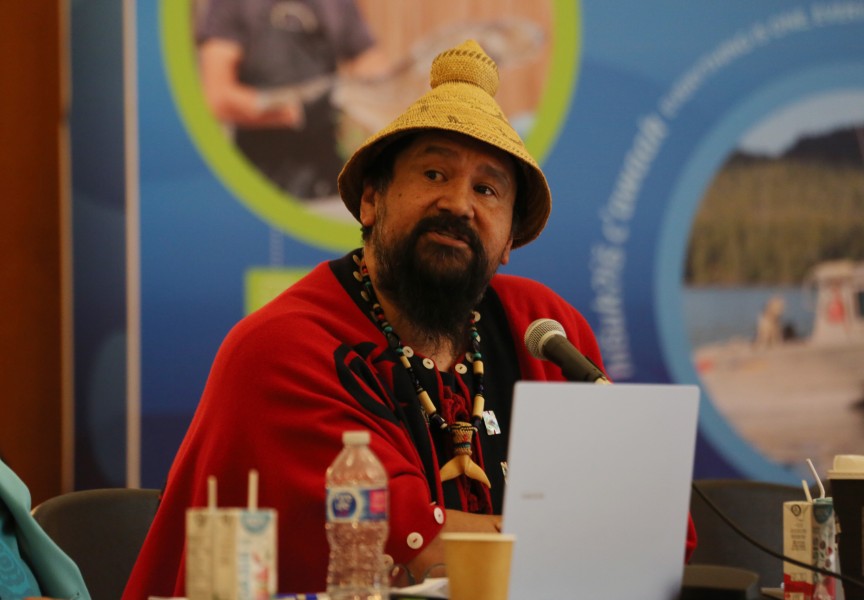At 3:30 a.m. on April 23, Thomas Ambrose’s closest family and friends gathered outside his house in Duncan to pray.
Ambrose’s father, Vince, led the prayer asking for strength. His soft voice penetrated the morning’s silence, fuelling Ambrose for the day ahead.
After stocking up on protein and water, Ambrose set out on a 255-kilometre bike-ride to Long Beach, near Tofino.
It was a trip he had been planning with his 15-year-old daughter, Edie Canute.
But after Canute tragically lost her life to suicide on Dec. 3, Ambrose decided to do the bike ride in her honour instead.
The Hesquiaht man still keeps the new bicycle he had bought for Canute prominently displayed in his living room.
“It really makes my heart feel sad,” he said, thinking about how he never had the chance to see her use it.
Despite training four days a week for months, Ambrose said the bike ride was “grueling.” And there were moments he said he didn’t think he'd make it.
“I really prayed,” he said. “I would say, ‘I know you’re with me Edie. I need your strength. I need your help.’”
Whenever pain crept into his knees or calves, Ambrose recalled being flooded with thoughts of his daughter.
“There's nothing I could do except pray,” he said. “That’s the only thing I could think about – praying to my daughter.”
Ambrose’s father, Vince, his two nephews, Tristan and Marcus Malone, along with his friend, Roger Charlie, supported him by riding stretches of the journey alongside him.
“This bike journey really helped my son to keep moving forward,” said Vince. “To[wards] healing [and] accepting his loss. He’s a very strong person to take this on.”
The family unit was “broken” by the residential school system, said Vince.
“It's really hard to pull families back together,” he said. “Sometimes it takes a great loss to do that.”
Between 2011 and 2016, the suicide rate among Indigenous peoples in Canada was three times higher than that of non-Indigenous populations, according to Statistics Canada.
Suicide rates were highest among youth aged 15 to 24, the agency reported.
“High rates of suicide among First Nations people, Métis and Inuit has been suggested to be the result of historical and intergenerational trauma experienced as a result of colonization and on-going marginalization,” a 2019 Statistics Canada report said.
To honour his late-daughter and raise suicide awareness, Ambrose said he plans on making the “Wish you were here, Edie,” bike ride an annual event.
Every year that it’s held, Vince said he will be by his son’s side.
“This was a family affair,” said Vince. “But there are other families out there who have suffered loss from suicide. We welcome anybody who wants to join in on an annual bike ride to bring suicide awareness.”
Vince said he’s struggled to cope with the loss of his granddaughter.
“I was just starting to connect with her,” he said, adding that he wished he had more time.
When Vince thinks about Canute, he proudly recalls the bond that she shared with her father.
“Every time my son got up to walk somewhere, she got up and walked right behind him or beside him,” Vince said. “I saw how close [they were.]”
During the 14-hour long healing journey, Ambrose’s sister Leah Malone supported by driving her vehicle along the route with supplies.
“It's an honour to be able to stand with [my brother] and support him in a healthy way in his grieving process,” she said. “It also helped me realize that I'm working to deal with my own grief and how to navigate through that healthily. It is a gigantic step forward to able to even discuss suicide.”
Leah said suicide isn’t openly spoken about because elders and chiefs were taught not to talk about it.
“It was learned that you don't speak [about suicide],” she said. “There were no coping skills to be able to talk and deal with suicide.”
There’s a “stigma” around it, so it’s “hush-hushed” and swept “under the rug,” Leah said.
“You don’t know what someone is going through unless you have those open lines of communication,” she said.
For everyone’s health and wellbeing, Leah said that it’s “extremely important” to be able to openly talk about suicide.
When Leah thinks about her niece, she remembers her curious spirit.
“She exuded positive energy – innocent, positive energy,” she said. “She had a lot to look forward to.”
As Ambrose and his supporters arrived at Esowista at the end of their bike ride around 7 p.m., they were greeted by around 30 members from the Tla-o-qui-aht First Nation who welcomed them to their territory.
Elmer Frank was among them.
Traditionally, the Tla-o-qui-aht First Nation councillor said, Nuu-chah-nulth communities would hold each other up and help those grieving from loss.
“I wanted to personally acknowledge [Thomas],” he said. “He really showed his strength of wanting to continue on in his life to uphold his other children, his family, and move towards healing and raising awareness that suicide in communities can be so hurtful.”
The traditional greeting from Tla-o-qui-aht was a “highlight” for Vince.
“To go back home with that in our hearts … that was the happy part of it,” he said. “When we embarked on the bike ride, it was more of a personal healing journey. And then it picked up steam and turned into something bigger than we expected.”
While Ambrose said his daughter wasn’t there physically, she was with him spiritually.
The outline of her eyes and smile were visible in the clouds, he said.
Ambrose often thinks back to his last conversation with Canute. It was only a couple of hours before she passed.
“I didn’t know,” he said. “I wish I could have reached out to her.”
The annual “Wish you were here, Edie” bike ride is Ambrose’s way of continuing to reach out to his daughter – to hold her up, and create a space to talk about suicide.
“Just because somebody is happy doesn't mean they're not going through depression,” he said. “Make sure that you're checking on people – talk to them. Lend them a hand. Because behind the scenes, they might be crying.”

